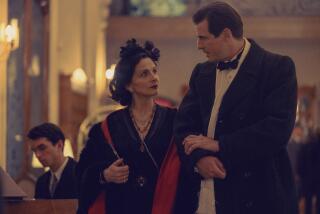Point at the Paparazzi, Then Look in the Mirror
- Share via
In a free society with a free press, the observation of Princess Diana’s brother that all paparazzi have “blood on their hands” really missed the mark, even though his feelings are certainly understandable.
After all, is there not also blood on the hands of those who grab the tabloids as soon as they hit the stands? Why is it that more people read the tabloids than major newspapers? Why is it that high prices are paid for pictures of celebrities with their clothes off or in places where they seek privacy? It’s because there’s a huge market, a hungering to see what celebrities do.
Ironically, most paparazzi are contract workers--entrepreneurs who take great risks because there are great payoffs if they’re successful. Is this not the American way? So why the call for new restrictive laws, particularly in an era when deregulation is firmly entrenched?
A free market is characterized by supply and demand, and there is little doubt that pictures of the late Princess Diana and Dodi Fayed were in great demand and short supply. Yet in the case of this tragedy, there is a tendency to take the moral high ground when it comes to how these colorful characters make a living.
Why is there so little talk of the reasons for such an increased demand for paparazzi products? Much as with the war on drugs, we try to stop the supply yet seem less interested in eliminating demand. Why the demand for pictures of the intimate moments of celebrities? Is it not true that we create the monster that we want slain? To paraphrase Pogo, is it not true that the enemy is us?
I do not defend the behavior of photographers so eager to make a buck that they blatantly invade the privacy of others. There is no excuse for ignoring injuries in the interest of obtaining pictures, as has been alleged in Princess Diana’s death. Yet there is a simple reason why the owners of tabloids pay big money for pictures of sex and gore: The public can’t get enough.
As we now know, the photographers were not that close to the car, the chauffeur was drunk, the vehicle was going way too fast and the Princess and Dodi Fayed were not wearing seat belts. In other words, there is much blame to go around. However, the need to blame is part of the public psyche, and clearly the paparazzi are an easy target.
It’s important to remember that the paparazzi play a positive as well as negative role in the lives of celebrities. When they want to be seen, celebrities seek the attention of the paparazzi. It is the paparazzi and their presence that light the fires of fame, and their absence signals the end of fame. However, when they desire privacy, celebrities show great annoyance at the attention they previously sought. In other words, there is a love-hate relationship between celebrities and the paparazzi that cannot be ignored.
The only way that the repugnant behavior of the paparazzi can be minimized is for the public to boycott their product. However, I suspect that as with the grape boycott of years ago, no such boycott could be successful for long. There’s just too much demand for the product, and too much profit in meeting that demand. Tabloid owners certainly know that, social responsibility be damned, they’ll always have plenty of customers.
*
Rosener can be reached by e-mail at [email protected]


